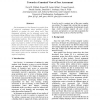Free Online Productivity Tools
i2Speak
i2Symbol
i2OCR
iTex2Img
iWeb2Print
iWeb2Shot
i2Type
iPdf2Split
iPdf2Merge
i2Bopomofo
i2Arabic
i2Style
i2Image
i2PDF
iLatex2Rtf
Sci2ools
ICALT
2007
IEEE
2007
IEEE
Towards a Canonical View of Peer Assessment
Peer Assessment (or Peer Review) is a popular form of reciprocal assessment where students produce feedback, or grades, for each others work. Peer Assessment activities can be extremely varied with participants taking different roles at different stages of the process and materials passing between roles in sophisticated patterns. This variety makes designing Peer Assessment systems very challenging. In this paper we present a number of Peer Assessment case studies and show how a simple review cycle can be used as a building block to achieve the more complex cases. We then propose a Canonical Use Case for Peer Assessment, in which a Review Plan is used to describe how review cycles can be combined to achieve the required complexity.
ICALT 2007 | Machine Learning | Peer Assessment | Peer Assessment Activities | Peer Assessment Systems |
| Added | 02 Jun 2010 |
| Updated | 02 Jun 2010 |
| Type | Conference |
| Year | 2007 |
| Where | ICALT |
| Authors | David E. Millard, Karen Fill, Lester Gilbert, Yvonne Margaret Howard, Patrick A. S. Sinclair, Damilola O. Senbanjo, Gary B. Wills |
Comments (0)

